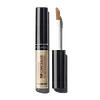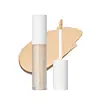What's inside
What's inside
 Key Ingredients
Key Ingredients

 Benefits
Benefits

 Concerns
Concerns

 Ingredients Side-by-side
Ingredients Side-by-side

Water
Skin ConditioningTitanium Dioxide
Cosmetic ColorantCyclopentasiloxane
EmollientPhenyl Trimethicone
Skin ConditioningTalc
AbrasiveButylene Glycol
HumectantCetyl PEG/PPG-10/1 Dimethicone
EmulsifyingPvp
Emulsion StabilisingCI 77492
Cosmetic ColorantPEG-10 Dimethicone
Skin ConditioningVinyl Dimethicone/Methicone Silsesquioxane Crosspolymer
Sodium Chloride
MaskingAluminum Hydroxide
EmollientTriethoxycaprylylsilane
Disteardimonium Hectorite
StabilisingStearic Acid
CleansingPhenoxyethanol
PreservativeCI 77491
Cosmetic ColorantChlorphenesin
AntimicrobialDimethicone
EmollientCI 77499
Cosmetic ColorantParfum
MaskingCalamine
AbsorbentEctoin
Skin ConditioningMannitol
HumectantYeast Extract
Skin ConditioningAlcohol
AntimicrobialCentella Asiatica Leaf Extract
Skin ConditioningGlycogen
HumectantMagnesium Ascorbyl Phosphate
AntioxidantAloe Barbadensis Leaf Extract
EmollientArnica Montana Flower Extract
MaskingGentiana Lutea Root Extract
Skin ConditioningAchillea Millefolium Extract
CleansingArtemisia Vulgaris Extract
Skin ConditioningGlycerin
HumectantPotassium Sorbate
PreservativeCitric Acid
BufferingSodium Benzoate
MaskingWater, Titanium Dioxide, Cyclopentasiloxane, Phenyl Trimethicone, Talc, Butylene Glycol, Cetyl PEG/PPG-10/1 Dimethicone, Pvp, CI 77492, PEG-10 Dimethicone, Vinyl Dimethicone/Methicone Silsesquioxane Crosspolymer, Sodium Chloride, Aluminum Hydroxide, Triethoxycaprylylsilane, Disteardimonium Hectorite, Stearic Acid, Phenoxyethanol, CI 77491, Chlorphenesin, Dimethicone, CI 77499, Parfum, Calamine, Ectoin, Mannitol, Yeast Extract, Alcohol, Centella Asiatica Leaf Extract, Glycogen, Magnesium Ascorbyl Phosphate, Aloe Barbadensis Leaf Extract, Arnica Montana Flower Extract, Gentiana Lutea Root Extract, Achillea Millefolium Extract, Artemisia Vulgaris Extract, Glycerin, Potassium Sorbate, Citric Acid, Sodium Benzoate
Centella Asiatica Extract
CleansingTitanium Dioxide
Cosmetic ColorantButylene Glycol
HumectantButylene Glycol Dicaprylate/Dicaprate
EmollientHydrogenated Polydecene
EmollientGlycerin
HumectantCaprylic/Capric Triglyceride
MaskingIsododecane
EmollientPolyglyceryl-3 Polyricinoleate
EmulsifyingTrimethylsiloxysilicate
EmollientSorbitan Isostearate
EmulsifyingCI 77492
Cosmetic ColorantDisteardimonium Hectorite
StabilisingMagnesium Sulfate
Bis-Diglyceryl Polyacyladipate-2
EmollientHydrogenated Polyisobutene
EmollientMethyl Methacrylate Crosspolymer
Water
Skin ConditioningSynthetic Beeswax
Emulsion StabilisingDisiloxane
Skin Conditioning1,2-Hexanediol
Skin ConditioningAluminum Hydroxide
EmollientMethyl Hydrogenated Rosinate
PerfumingSorbitan Sesquioleate
EmulsifyingTriethoxycaprylylsilane
CI 77491
Cosmetic ColorantSorbitan Olivate
EmulsifyingSodium Benzoate
MaskingCI 77499
Cosmetic ColorantLimnanthes Alba Seed Oil
Skin ConditioningPotassium Sorbate
PreservativeCeramide NP
Skin ConditioningTrisodium Ethylenediamine Disuccinate
Phytosphingosine
Skin ConditioningHydrogenated Lecithin
EmulsifyingPentylene Glycol
Skin ConditioningLeptospermum Scoparium Leaf Extract
Skin ConditioningLactobacillus Ferment
Skin ConditioningMadecassoside
AntioxidantHoney Extract
HumectantCentella Asiatica Extract, Titanium Dioxide, Butylene Glycol, Butylene Glycol Dicaprylate/Dicaprate, Hydrogenated Polydecene, Glycerin, Caprylic/Capric Triglyceride, Isododecane, Polyglyceryl-3 Polyricinoleate, Trimethylsiloxysilicate, Sorbitan Isostearate, CI 77492, Disteardimonium Hectorite, Magnesium Sulfate, Bis-Diglyceryl Polyacyladipate-2, Hydrogenated Polyisobutene, Methyl Methacrylate Crosspolymer, Water, Synthetic Beeswax, Disiloxane, 1,2-Hexanediol, Aluminum Hydroxide, Methyl Hydrogenated Rosinate, Sorbitan Sesquioleate, Triethoxycaprylylsilane, CI 77491, Sorbitan Olivate, Sodium Benzoate, CI 77499, Limnanthes Alba Seed Oil, Potassium Sorbate, Ceramide NP, Trisodium Ethylenediamine Disuccinate, Phytosphingosine, Hydrogenated Lecithin, Pentylene Glycol, Leptospermum Scoparium Leaf Extract, Lactobacillus Ferment, Madecassoside, Honey Extract
 Reviews
Reviews

Ingredients Explained
These ingredients are found in both products.
Ingredients higher up in an ingredient list are typically present in a larger amount.
Aluminum Hydroxide is a form of aluminum. It can be naturally found in nature as the mineral gibbsite. In cosmetics, Aluminum Hydroxide is used as a colorant, pH adjuster, and absorbent.
As a colorant, Aluminum Hydroxide may add opacity, or reduce the transparency. Aluminum hydroxide is contains both basic and acidic properties.
According to manufacturers, this ingredient is an emollient and humectant. This means it helps hydrate the skin.
In medicine, this ingredient is used to help relieve heartburn and help heal ulcers.
There is currently no credible scientific evidence linking aluminum hydroxide in cosmetics to increased cancer risk.
Major health organizations allow the use of aluminum hydroxide in personal care products and have not flagged it as a carcinogenic risk at typical usage levels.
Learn more about Aluminum HydroxideButylene Glycol (or BG) is used within cosmetic products for a few different reasons:
Overall, Butylene Glycol is a safe and well-rounded ingredient that works well with other ingredients.
Though this ingredient works well with most skin types, some people with sensitive skin may experience a reaction such as allergic rashes, closed comedones, or itchiness.
Learn more about Butylene GlycolCi 77491 is also hydrated iron III oxide. It's sole purpose is to give a red/pink hue to products.
Iron III oxides are classified as inorganic chemicals for coloring.
Synthetically created Ci 77491 is considered safer than those naturally found. This is because the synthetically created version may contain less impurities. Iron oxides are generally non-toxic and non-allergenic.
Learn more about CI 77491Ci 77492 is also hydrated iron III oxide. It's sole purpose is to give a yellow hue to products.
Iron III oxides are classified as inorganic chemicals for coloring.
Synthetically created Ci 77492 is considered safer than those naturally found. This is because the synthetically created version may contain less impurities. Iron oxides are generally non-toxic and non-allergenic.
Learn more about CI 77492Ci 77499 is also hydrated iron III oxide. It is created from mixing red and black iron oxides. This helps give shades of darkness to a product.
Iron III oxides are classified as inorganic chemicals for coloring.
Disteardimonium Hectorite comes from the clay mineral named hectorite. It is used to add thickness to a product.
It can also help stabilize a product by helping to disperse other ingredients.
Hectorite is a rare, white clay mineral.
Learn more about Disteardimonium HectoriteGlycerin is already naturally found in your skin. It helps moisturize and protect your skin.
A study from 2016 found glycerin to be more effective as a humectant than AHAs and hyaluronic acid.
As a humectant, it helps the skin stay hydrated by pulling moisture to your skin. The low molecular weight of glycerin allows it to pull moisture into the deeper layers of your skin.
Hydrated skin improves your skin barrier; Your skin barrier helps protect against irritants and bacteria.
Glycerin has also been found to have antimicrobial and antiviral properties. Due to these properties, glycerin is often used in wound and burn treatments.
In cosmetics, glycerin is usually derived from plants such as soybean or palm. However, it can also be sourced from animals, such as tallow or animal fat.
This ingredient is organic, colorless, odorless, and non-toxic.
Glycerin is the name for this ingredient in American English. British English uses Glycerol/Glycerine.
Learn more about GlycerinPotassium Sorbate is a preservative used to prevent yeast and mold in products. It is commonly found in both cosmetic and food products.
This ingredient comes from potassium salt derived from sorbic acid. Sorbic acid is a natural antibiotic and effective against fungus.
Both potassium sorbate and sorbic acid can be found in baked goods, cheeses, dried meats, dried fruit, ice cream, pickles, wine, yogurt, and more.
You'll often find this ingredient used with other preservatives.
Learn more about Potassium SorbateSodium Benzoate is a preservative. It's used in both cosmetic and food products to inhibit the growth of mold and bacteria. It is typically produced synthetically.
Both the US FDA and EU Health Committee have approved the use of sodium benzoate. In the US, levels of 0.1% (of the total product) are allowed.
Sodium benzoate works as a preservative by inhibiting the growth of bacteria inside of cells. It prevents the cell from fermenting a type of sugar using an enzyme called phosphofructokinase.
It is the salt of benzoic acid. Foods containing sodium benzoate include soda, salad dressings, condiments, fruit juices, wines, and snack foods.
Studies for using ascorbic acid and sodium benzoate in cosmetics are lacking, especially in skincare routines with multiple steps.
We always recommend speaking with a professional, such as a dermatologist, if you have any concerns.
Learn more about Sodium BenzoateTitanium dioxide is a mineral UV filter widely used in sunscreens and cosmetics.
It is one of only two UV filters officially classified as “mineral” by regulatory agencies, the other being zinc oxide.
Titanium dioxide provides broad-spectrum protection mostly in the UVB and UVAII range, with some protection in the UVAI range.
While its UVA protection isn’t as strong as zinc oxide’s, the difference is minor.
A common myth is that mineral UV filters reflect UV light. However, modern research shows titanium dioxide absorbs UV radiation like chemical filters (~95% absorption & 5% reflection).
Thanks to its non-irritating nature, titanium dioxide is suitable for sensitive, acne-prone, or redness-prone skin. It is unlikely to cause "eye sting" like other sunscreen ingredients.
A major drawback of this ingredient is its white cast and thick texture. This is why mineral sunscreens often leave a white cast and are less cosmetically elegant than chemical/hybrid sunscreens.
To improve white cast and spreadability, micronized or nano-sized titanium dioxide is often used.
There are ongoing concerns surrounding nano-titanium oxide's impact on marine ecosystems.
There is no conclusive evidence that any form of titanium oxide (or any other sunscreen ingredients) will cause harm to marine ecosystems or coral reefs. The science is still developing but many consumers are keeping a close eye on this issue.
Please note, many destinations have reef-safety sunscreen rules. For instance, the U.S. Virgin Islands advises all visitors to use non-nano mineral sunscreens.
Nano mineral sunscreens once raised safety concerns about absorption into skin.
Extensive research has shown that they do not penetrate healthy or damaged skin; they remain safely on the surface and the top layer of dead skin (stratum corneum).
You'll likely find titanium dioxide bundled with alumina, silica, or dimethicone. These ingredients help make titanium dioxide highly photostable; this prevents it from interacting with other formula components under UV light.
Learn more about Titanium DioxideTriethoxycaprylylsilane is a silicone used to bind and stabilize ingredients.
As an emulsifier, it helps prevent ingredients from separating. This can help elongate the shelf life of products.
Triethoxycaprylylsilane is often used to coat mineral sunscreens ingredients to help give a better feel. It also helps reduce oxidative stress in sunscreens.
Learn more about TriethoxycaprylylsilaneWater. It's the most common cosmetic ingredient of all. You'll usually see it at the top of ingredient lists, meaning that it makes up the largest part of the product.
So why is it so popular? Water most often acts as a solvent - this means that it helps dissolve other ingredients into the formulation.
You'll also recognize water as that liquid we all need to stay alive. If you see this, drink a glass of water. Stay hydrated!
Learn more about Water